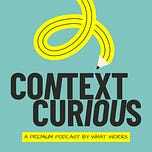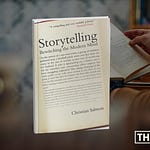
Welcome to the 3rd edition of This is Not Advice, my advice column that’s not an advice column for paid subscribers of What Works.
If you’re a paid subscriber, thank you! Keep reading for the full column—or listen to the complete audio above.
If you’re not yet a paid subscriber, you can read or listen to the first half of the piece! Or, consider upgrading your subscription to get the whole thing.
This week, I am tackling a question that came up during last week’s workshop on media ecosystems (link to replay below!) and that my husband Sean asked me just this morning. It also came up a number of times during a workshop on audio essays that I taught earlier this year.
So I’m going to assume this is something that a lot of folks struggle with—myself included on a regular basis.
Here’s the gist:
I’ve accumulated lots of thoughts that I want to turn into a cohesive project—
maybe a book, a podcast series, an online course, even a single essay.
How do I even begin working on something like that?
Turning ideas into projects is a valuable skill in the 21st-century economy.
Whether your thing is making an app or producing a documentary or organizing a protest, they’re all a matter of turning disparate ideas into cohesive projects. Thanks to some combo of education, self-help advice, and professional growth workshops, even our identities have become projects. So yes, this question is a pressing concern for many.
Anyhow, there was a not-so-long-ago time when I would have had a hard time answering this question for myself. Every project I embarked on and completed felt like the result of luck. Luck gave me a vision of the completed thing so that I could make it real in whatever form it took. There was no “figuring it out;” there was no process. Either my brain produced the spitting image of the final product for me to recreate—or I couldn’t create it.
It was also my luck that I got along this way fairly well. I could churn out enough projects in this fashion that I kept a roof over my head by earning the attention of people who were willing to pay me for these projects. But I’d get frustrated when my ambitions outpaced my luck. I wanted to stretch myself and make more remarkable work, but my luck didn’t reach that far.
So I had to change my approach. In my book, I called this “practice.” For me, practice is presence, process, and groundedness. And developing a practice can apply to all sorts of endeavors. Since we’re talking about a certain kind of project today, I’m going to use a different word—revision.
Revision is a practice, and it happens to be critical to creating remarkable work.
Revision feels unproductive. It’s often slow, inefficient, and results in gobs of work that hits the wastebasket instead of the final piece. Revision flies in the face of everything that we’ve learned as neoliberal capitalist subjects. Productive work is literally work that creates a product. And embracing revision requires making work that won’t be sold.
If writing is 90% revision, as I believe it is, no wonder people claim to dislike writing—we’ve been conditioned to feel like it's wrong. Our resistance to the work of revision is a byproduct of market forces. And yet, revision is the only way to turn a jumble of thoughts into a cohesive project.
I’ve noticed—both in myself and others—that we often try to get the revision out of the way before we start drafting. We try to overcome every mental hurdle before we put words on a page, turn on a mic, or start laying down code. That way, the act of making something feels as efficient as possible. We try to avoid the revision process that would come in later steps and, in so doing, avoid starting.
I realized a few years ago that embracing revision was the only way I could fulfill my ambitions. I had to be willing to produce words, sentences, and even whole drafts that would never be published. Never be sold. I had to make those going-nowhere fragments and notes in order to make the things that should be published, could be sold, would realize my ambition.
If I can only approach a jumble of thoughts when a vision of the final product appears to me, I will be haunted by the specter of projects that could have been, while actually creating very little (or creating little I’m satisfied with). But if I approach my jumble of thoughts in a succession of attempts I’m willing to throw out, I’m not only more likely to make the project a reality, but that product will be better for it.
It’s those attempts—the stabs in the dark—that teach me how to turn the jumble of thoughts into a cohesive project.
I will share my process with you in the terms I know it best—which is composing essays (both written and audio). My hope is that it’s helpful beyond “just” the writing process and can be applied to all sorts of media production.












